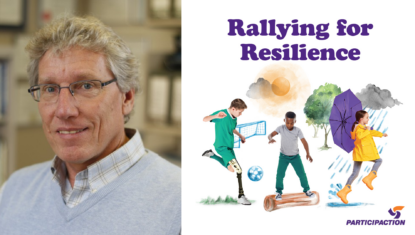07/05/2024
Ottawa, Ontario — Tuesday May 7, 2024

Kids get a “D+” for overall physical activity as new research highlights climate change as an added barrier to getting children and youth active.
TORONTO, May 7, 2024/CNW/ — Today, ParticipACTION released the 2024 Report Card on Physical Activity for Children and Youth, the most comprehensive assessment of child and youth physical activity in Canada. Containing evidence-informed grades, the Report Card highlights barriers to physical activity experienced by children and youth in Canada, and the immediate need for collective action to get and keep kids active in a changing climate.
The 2024 Report Card reveals higher grades compared to the 2022 edition in some areas, including overall physical activity coming in at a “D+”, an increase from a “D”. While the overall physical activity grade has improved, a “D+” is still an undesirable grade as it reveals that only 39% of children and youth (five to 17 years of age) in Canada are getting the recommended 60 minutes of moderate- to vigorous-intensity physical activity per day.
Barriers to getting active vary for kids. Some of the well-known contributing factors include increased screen time, costs and time constraints. Now, climate change could be added to the list. Environmental indicators show that the number of annual weather alerts in Canada have more than doubled in the past 10 years. Unfavourable weather and climate conditions such as heatwaves, heavy rain and poor air quality have the potential to increase time spent indoors being sedentary. The 2024 Report Card highlights that the current and impending impacts of a changing climate could present added and significant barriers to children and youth in improving their overall physical activity levels.
“The effects of climate change could be particularly harmful for kids as they face special risks from air pollution and extreme heat,” says Dr. Mark Tremblay, Chief Scientific Officer, ParticipACTION Report Card and Senior Scientist at the CHEO Research Institute. “Increasing physical activity can help mitigate the impacts of climate change and build resilience among children and youth. Climate-related changes introduce a new layer of challenges that have only amplified the importance of having a generation of kids that are physically fit and active.”
As Canada recovers from the residual effects of the pandemic on physical activity, such as lockdowns and the pausing of organized sports, families, schools, and organizations have worked to revive physical activity opportunities. This year’s grade for household support for physical activity has increased from a “C” to a “C+”, while schools remain at a “B-” and organized sports have improved from a “C+” to a “B”.
Unfortunately, recovery hasn’t progressed at the same rate for all as the Report Card highlights only 31% of girls, compared to 57% of boys, are meeting the physical activity recommendation. Research also shows that kids from low-income neighbourhoods rely more on outdoor spaces for play and physical activity due to a lack of family resources. It’s imaginable that rising temperatures and unpredictable weather events affiliated with a changing climate could increase the potential for even greater disparities among equity-denied groups whose ability to be active depends heavily on favourable weather and environmental conditions.
“Efforts from multiple sectors and people are needed to get and keep children and youth active in a changing climate,” says Elio Antunes, President and CEO of ParticipACTION. “Coordinated strategic investments and health promotion initiatives that consider climate implications on physical activity among children and youth, with a specific emphasis on equity-denied communities, could make physical activity more accessible, help kids build physical and emotional resilience, and begin to future-proof the next generation.”
The 2024 Report Card uncovers timely opportunities to help mitigate the negative health impacts of climate change, and provides recommendations for all levels of government, schools and educators, and parents and support networks on how they can collectively contribute to reducing barriers and improving physical activity levels for children and youth in Canada.
To read Rallying for Resilience: Keeping Children and Youth Active in a Changing Climate – the Highlight and full Technical Report Cards – please click HERE.
About ParticipACTION
ParticipACTION is a national non-profit charitable organization that envisions a Canada where physical activity is a vital part of everyday life for everyone. As Canada’s leading physical activity organization, ParticipACTION works with its partners, which include organizations in the sport, physical activity and recreation sectors, alongside government and corporate sponsors, to help people move more where they live, learn, work and play. ParticipACTION is generously supported by the Government of Canada. Learn how ParticipACTION has been moving people in Canada for over 50 years at ParticipACTION.com.
About the Report Card
The ParticipACTION Report Card on Physical Activity for Children and Youth synthesizes data from multiple sources, including the best available peer-reviewed research, to assign evidence-informed grades across 14 indicators. The Report Card has been replicated in over 70 cities, provinces and countries, where it has served as a blueprint for collecting and sharing knowledge about the physical activity of young people around the world.
ParticipACTION’s strategic partner, the Healthy Active Living and Obesity Research Group at the CHEO Research Institute (HALO-CHEO), played a critical role in the research and development of the 2024 Report Card. Special thanks are also extended to the Canadian Fitness and Lifestyle Research Institute (CFLRI).
The 2024 ParticipACTION Report Card on Physical Activity for Children and Youth is proudly supported by Saputo.
